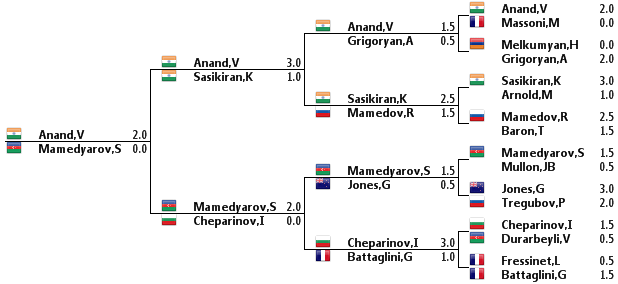Ask Coach Jessica: Types of Tournaments and How to Prepare For Them
So, we will start with a Round Robin. This format works well with small numbers of participants. It's a tournament where everyone plays everyone else! Your chart would look like this.

In this eight-person event, you would expect to play seven games, since you don't play yourself! That's why you see those "X"s there. If OttieOtter is number 1, he will not play number 1. (You read the chart by going across.) It is non-elimination. You can tally your total or find the percentage and compare it to other participants. These are great events that can also be done as "quads" (groups of four) to ensure people of the same skill level play against each other.
Another type of tournament is the knock-out. Surely you've seen these brackets in other sports as well.
Corsica Masters Knockout
The knock-out is one way of finding a clear winner. But it can also lead to some unluckiness! FIDE (the World Chess Federation) used to organize the world championship cycle as a knock-out event with 128 players starting out. Then it moved to a round robin format. Any number of players could participate in a knockout; although, the odd-person out would have to get a bye.
The very popular Swiss system format is one you'll likely play in at a Saturday tournament in your town at some point (in the U.S. anyway...what format do your local tournaments use in other countries? Share in the Ask Coach Jessica Forum!). I like these tournaments because there is less luck involved. Players are divided by rating, and for the first round are paired "top half versus bottom half." So, again if OttieOtter is the highest-rated person in his section, and EarthyZest is the 6th-highest, and there are 10 players, Ottie would play Earthy.
1. Ottie vs 6. Earthy
2. King vs 7. Knight
3. Queen vs 8. Pawn
4. Rook vs 9. My Cat
5. Bishop vs 10. BoundingOwl
This makes round one the most challenging round for players 6-10, and often 1-5 will win this first game handily. But it's non-elimination! The second and following rounds should be more competitive (and maybe a "fairer match"). If you win, you play someone else who's won; and if you've lost, you'll play someone else who has lost, too. Let's say My Cat, in a shocking turn of events, has beaten the number 4 player, Rook.
Next, she might have to play someone even harder, who also won! But then, My Cat has been known to win many surprising tournaments. She's just not very consistent. There are times when My Cat appears to be preparing well for a chess tournament by sleeping great numbers of hours and concentrating on what I assume are her opening lines when she stares out the window.

When preparing, then, no need to learn a new opening a few days before your tournament!! This is not the best place to try it out. You should try new openings on ChessKid playing Fast or Slow Chess, or at your chess club at school. You'll feel more confident at a tournament playing an opening you know well.
What you can do a few days before a tournament, besides sleep a lot and eat well, and stare out the window trying to remember your opening moves, is practice tactics! Solving puzzles will make you feel really smart. Plus it will prepare your brain for finding the same patterns over the chessboard while you're playing the tournament.
Here are some puzzles for you to prepare for your next tournament!
This is an h-file puzzle. It's mate in three for Black, and your hint is that both those knights in the center are going to come off the board in a forceful way. There is also a forcing fork in there!

RELATED STUDY MATERIAL
- Here's some other h-file attack puzzles from BoundingOwl;
- PlayfulSquirrel also has a fun video on the same idea;
- The ChessKid Online Nationals, hosted here every summer, is one example of a round robin. Read about the 2103 winners!